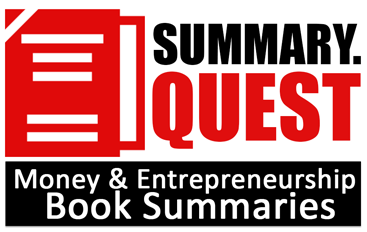In “The 10 Pillars of Wealth,” Alex Becker flips the script on everything you thought you knew about getting rich. Forget luck or privilege—Becker argues that true wealth is built through mindset, discipline, and bold choices. This book reveals the exact beliefs and habits that set millionaires apart from the rest. If you’re ready to stop chasing money and start attracting it, “The 10 Pillars of Wealth” will guide you through the exact steps needed to build million-dollar businesses. Here are some of the key ideas from the book:
Key Idea No. 1: Escape the Slow Trap

Most people believe the path to wealth is slow and steady—work a regular job, save every month, and wait patiently for life to reward your consistency. This idea, often called the “get-rich-slowly” mindset, feels safe. It promises stability and a future where time and discipline will eventually bring financial freedom. But here’s the problem: this approach often leads not to success, but to mediocrity.
Getting rich slowly sounds responsible on the surface, but underneath, it’s often driven by fear—fear of failure, risk, and the unknown. It encourages playing it safe, relying on the system, and hoping that your loyalty and patience will eventually pay off. But in today’s fast-paced world, playing it safe is often the riskiest move.
When you follow the traditional path, you give away control. Your income is tied to someone else’s decisions—your boss, your company, or the job market. Promotions are rare, raises are small, and you’re often just one corporate restructuring away from unemployment. Instead of building wealth, you end up maintaining a lifestyle just barely ahead of your expenses.
On the other hand, choosing to get rich faster by investing in yourself changes the game. It doesn’t mean taking foolish risks or chasing scams. It means betting on your own potential—learning valuable skills, launching a business, or turning your knowledge into income. You move from being dependent to being in charge. Your effort and talent become the drivers of your wealth, not a fixed paycheck.
People often avoid this path because it involves risk and the chance of failure. But failure isn’t the end—it’s a lesson. Entrepreneurs and self-made individuals don’t win because they avoid failure; they win because they learn from it. Every setback teaches them something new, sharpens their strategy, and makes the next attempt stronger. In this world, failure is feedback, not defeat.
Another danger of the slow path is complacency. You stay in a job you don’t love because it’s stable. You save a small amount each month and hope it’s enough someday. Meanwhile, inflation rises, costs increase, and opportunities pass you by. Over time, this approach can trap you in a cycle of just getting by—never thriving, never pushing your limits, never achieving more than average.

That’s why working smart is more important than just working hard. You can spend years grinding at something that doesn’t move the needle. Or you can focus your energy on learning skills that are in demand, solving problems people are willing to pay for, or creating systems that generate income while you sleep. It’s about doing fewer things with bigger impact.
The world is changing fast. Technology, markets, and industries shift in months, not decades. If you’re not learning and adapting, you’re falling behind. Getting rich faster isn’t just about money—it’s about staying sharp, flexible, and ready to seize the next big opportunity. The slow path may feel comfortable, but comfort rarely leads to greatness.
Key Idea No. 2: Escape Time-for-Money Trap

Most people think entrepreneurship is the key to freedom. The common belief is that if you quit your 9-to-5 job and start your own business, you’ll finally be free to live life on your own terms. But for many, the reality turns out very different. Instead of breaking free from the rat race, they end up building a job for themselves—one that demands even more time and energy than before.
In traditional jobs, your income is directly tied to the hours you work. If you stop working, you stop earning. Many new entrepreneurs fall into the same trap. They launch businesses that depend entirely on their personal effort—taking client calls, managing tasks, solving problems, and working overtime to keep things moving. Even though they’re technically “the boss,” their time is still their biggest asset, and they’re constantly trading it for money. This model is just a fancier version of a job—and it’s a risky one.

Imagine a coffee shop owner who spends 60 hours a week managing everything—from pouring drinks to handling customer complaints—and then loses income when they take a day off. That’s not freedom; it’s dependency. A true entrepreneur builds systems that handle the work so their business can run even when they’re not there.
So how do you create this independence? It starts by redefining what success looks like. Instead of focusing on how much you work, focus on how effectively your business creates value without constant oversight. Imagine a vending machine. Once it’s set up and stocked, it sells products on its own. No manager. No cashier. That’s the kind of model you want to aim for in your business. Here are few steps to achieve this:
- Build Scalable Systems: It starts with systems. You need tools, processes, and people that can handle your business without your constant attention. This might mean automating customer support with a chatbot, creating a training guide for employees so they don’t rely on you for every answer, or setting up software to handle bookings, payments, or marketing. The more you automate and delegate, the more your business can run on its own.
- Ask Critical Questions: Next, ask yourself two important questions: Can this business generate income without my direct involvement? And, can someone else or some technology do this task instead of me? These questions force you to think beyond personal labor and focus on creating value that lasts. If your business relies on you being present for every transaction, it’s still a job in disguise. But if it’s built around systems that operate independently, you’re building something truly scalable.
- Invest in Systems: Investing in these systems requires more than just effort; it demands intentional choices about how you spend your time and money. Instead of spending your profits on personal expenses, put money back into the business. Buy better tools. Hire a virtual assistant. Build a website that handles orders automatically. Create digital products that can be sold over and over. The goal is to build a machine—something that keeps producing income even if you take a step back.
- Think Like an Owner: Most importantly, start thinking like an owner, not just a worker. Owners build systems. Workers run them. If you’re stuck doing everything yourself, your business owns you—not the other way around. But when you focus on building repeatable systems that don’t rely on your personal labor, your business becomes scalable, sustainable, and sellable.
Separating your time from your income isn’t just about money—it’s about freedom. It’s about creating a life where you’re not chained to a desk, a task list, or your own business. Instead, you’re free to think, create, grow—and actually enjoy the success you’ve built.
That’s the real goal of entrepreneurship.
Key Idea No. 3: Power of Personal Responsibility
In a world full of uncertainty, chaos, and rapid change, the idea of personal responsibility often gets overlooked. It’s easy to blame bad luck, the economy, society, or even other people for where we are in life. But here’s the truth—if you want to achieve something bigger, if you want real control over your life, it starts with one powerful realization: You are responsible for how you respond to everything.
Taking personal responsibility doesn’t mean you’re to blame for everything that happens. It means accepting that how you handle life’s ups and downs is fully in your hands. This shift in mindset—from reacting to taking charge—is what separates people who grow and thrive from those who stay stuck.

The first step to owning your life is learning to see problems before they become disasters. Most people wait until things are falling apart before they act. But the ability to look ahead and spot potential challenges early can save you time, stress, and setbacks. This isn’t about being fearful or pessimistic—it’s about being smart. Asking yourself simple questions like, “What could go wrong here?” or “Is there anything I’m ignoring?” builds awareness. Whether you’re switching careers, starting a business, or improving a relationship, this habit of thinking ahead puts you in a stronger position.
Once you’ve identified possible problems, the next step is to take control of what you can. You may not be able to change the job market, control inflation, or fix everything overnight—but there are always steps you can take. Cutting back on spending, picking up a new skill, setting boundaries, or changing your daily routine—these are choices that move you forward. The focus should always be on what’s in your power, no matter how small it seems. That’s how momentum starts.
But you don’t have to figure it all out on your own. One of the smartest things you can do is learn from others. Talk to people who’ve been where you are. Listen to their failures and successes. Read about people who took risks, fell, got back up, and made it work. Their experiences can offer solutions you haven’t thought of—and save you from wasting time on avoidable mistakes.

Personal responsibility isn’t about being perfect or having all the answers. It’s about showing up every day and choosing to respond with intention instead of letting life just “happen” to you. It’s about building a future instead of waiting for one. And most importantly, it’s about realizing that the path to something bigger always starts with owning your role in the present.
Key Idea No. 4: Do What Brings Income
In today’s entrepreneurial world, there’s a dangerous myth that being busy means being successful. The image of someone working 16-hour a day, juggling endless tasks, and constantly grinding has become a badge of honor. But in reality, success doesn’t come from how much you do—it comes from what you focus on. If you want to build real income, real growth, and real freedom, the smartest thing you can do is focus only on what gets you paid.
- Focus on High-ROI Activities: Not every task in your day is equally important. Replying to emails, attending meetings, tweaking your website—these might feel productive, but they’re often distractions from the things that actually bring in money. The goal isn’t to stay busy; the goal is to be effective. The real key to success lies in identifying what has the highest return on your time and energy. This means prioritizing work that creates value for your business and steering clear of activities that distract from your financial goals.
- Delegate Low-value Tasks: A common mistake many solo entrepreneurs make is thinking they have to do everything themselves. But your time is limited. Spending it on low-value tasks like data entry or managing your social media posts only slows you down. Delegating these tasks—whether to a virtual assistant or using automation tools—frees you up to do the high-impact work that pays the bills and grows the business. Just like a chef focuses on cooking, not cleaning the kitchen, you should be focusing on your core strengths, not your to-do list.
- Strategic Time Management: Managing your time wisely is just as important. Time is the one thing you can never get back, so how you spend it matters. It’s easy to feel productive while doing busywork, but unless that work is bringing in money or moving your business forward, it’s just noise. The trick is to block out time for the few activities that really matter—client calls, creating products, closing deals—and cut out distractions. When your time and tasks are aligned with your financial goals, every hour becomes more valuable.
- Adapt and Scale: Another important factor is adaptability. As businesses grow, the way you allocate your time and resources will change. What worked when you were working alone might not apply once you have a team or expanded your offerings. This means being open to shifting priorities and adjusting strategies based on what’s most effective at any given moment. For instance, an early-stage business owner might focus on hands-on client work, but as the company scales, their role could shift toward leadership, innovation, or exploring new revenue streams. Staying flexible allows you to respond to challenges and opportunities without losing sight of your financial objectives.
Success isn’t about doing more—it’s about doing what matters. When you focus only on the work that gets you paid, you stop wasting time, avoid burnout, and start building a business that actually works.
Key Idea No. 5: The Power of Community & Mentorship
The idea of the lone genius has always been appealing. We admire the stories of entrepreneurs who built billion-dollar companies in their garages or athletes who trained alone to reach greatness. But this image, as powerful as it is, leaves out a big part of the truth: nobody truly succeeds alone.

Human beings are social by nature. We learn faster, think better, and grow more when we’re surrounded by the right people. Whether it’s friends who challenge us or mentors who guide us, the people in our lives play a critical role in our journey to success. This isn’t just feel-good talk—it’s backed by psychology and real-world experience. The environment you live and work in shapes your mindset, habits, and even your belief in what’s possible.
Competitive friends are more than just rivals. They are the people who push you to level up. Think about athletes training together—they don’t just compete; they raise each other’s standards. One person’s progress becomes fuel for everyone else. It’s the same in any field. When you’re around people with ambition, big goals become normal. You don’t feel like an outsider for dreaming big—you feel like you’re just getting started.
This kind of healthy competition helps keep motivation high. It also creates accountability. When you see your peers working hard and improving, it encourages you to keep going too. Over time, this turns into a culture of growth where everyone benefits—not just individually, but as a group. Progress becomes contagious.

And then there are mentors. These are the people who’ve walked the path before you. They’ve made mistakes, learned from them, and now have the wisdom to help you avoid the same pitfalls. A mentor doesn’t just give you tips—they give you perspective. They help you see the bigger picture when you’re too caught up in the moment. They’re not there to hand you easy answers but to guide you toward better questions and smarter choices.
But mentorship is a two-way street. It’s not about blindly following someone—it’s about building a real relationship based on mutual respect. A good mentor sees your potential and helps you bring it out. And if you’re committed to learning and growing, the relationship becomes meaningful for both of you.
If you want to surround yourself with competitive friends and great mentors, start by stepping into the right spaces. Join communities where people share your values and goals. Whether it’s online groups, local meetups, or industry events, these are the places where driven people come together. Watch how they talk, how they help others, and how they carry themselves. Reach out, ask questions, and show genuine interest—not just in what you can get, but in how you can grow.
Building these relationships takes time. Trust doesn’t happen overnight. But if you’re patient and consistent, you’ll begin to find people who challenge you, support you, and help shape your journey. In the end, the smartest way to succeed is not by going it alone—but by growing with those who want to succeed just as much as you do.
I hope you’ve learned a few key lessons. But if you think money is holding you back, think again. The $100 Startup by Chris Guillebeau proves that your skills, ideas, and a bit of creativity are far more valuable than a big bank account when it comes to starting a business. Don’t let this opportunity slip away—click here to discover how you can turn what you already know and love into real income.

Leave a Reply